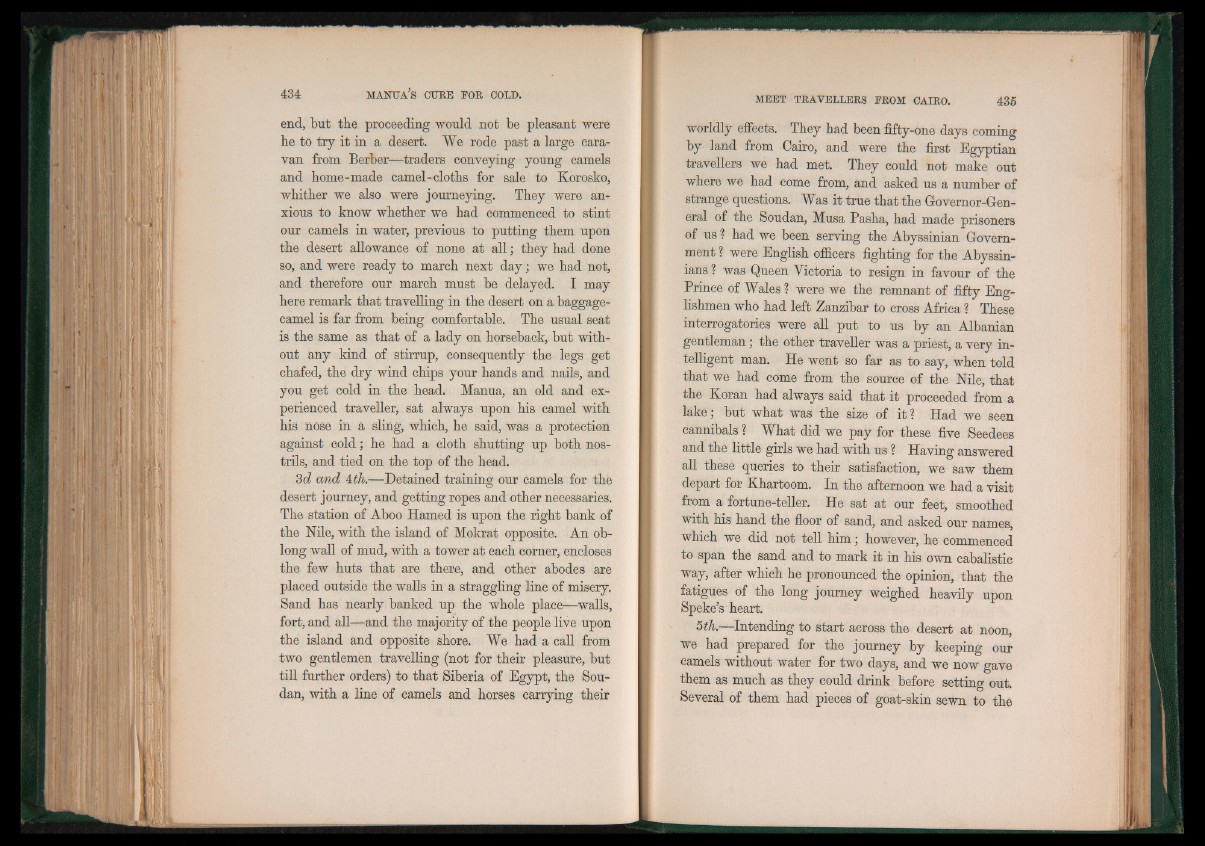
end, but the proceeding would not be pleasant were
he to try it in a desert. We rode past a large caravan
from Berber—traders conveying young camels
and home-made camel-cloths for sale to Korosko,
whither we also were journeying. They were anxious
to know whether we had commenced to stint
our camels in water, previous to putting them upon
the desert allowance of none at a ll; they had done
so, and were ready to march next day; we had not,
and therefore our march must be delayed. I may
here remark that travelling in the desert on a baggage-
camel is far from being comfortable. The usual seat
is the same as that of a lady on horseback, but without
any kind of stirrup, consequently the legs get
chafed, the dry wind chips your hands and nails, and
you get cold in the head. Manua, an old and experienced
traveller, sat always upon his camel with
his nose in a sling, which, he said, was a protection
against cold; he had a cloth shutting up both nostrils,
and tied on the top of the head.
3d and 4 th.—Detained training our camels for the
desert journey, and getting ropes and other necessaries.
The station of Aboo Hamed is upon the right bank of
the Nile, with the island of Mokrat opposite. An oblong
wall of mud, with a tower at each corner, encloses
the few huts that are there, and other abodes are
placed outside the walls in a straggling line of misery.
Sand has nearly banked up the whole place—walls,
fort, and all—and the majority of the people live upon
the island and opposite shore. We had a call from
two gentlemen travelling (not for their pleasure, but
till further orders) to that Siberia of Egypt, the Soudan,
with a line of camels and horses carrying their
worldly effects. They had been fifty-one days coming
by land from Cairo, and were the first Egyptian
travellers we had met. They could not make out
where we had come from, and asked us a number of
strange questions. Was it true that the Governor-General
of the Soudan, Musa Pasha, had made prisoners
of us ? had we been serving the Abyssinian Government
? were English officers fighting for the Abyssin-
ians ? was Queen Victoria to resign in favour of the
Prince of Wales? were we the remnant of fifty Englishmen
who had left Zanzibar to cross A f r ica. ? These
interrogatories were all put to us by an Albanian
gentleman; the other traveller was a priest, a very intelligent
man. He went so far as to say, when told
that we had come from the source of the Nile, that
the Koran had always said that it proceeded from a
lake) but what was the size of it ? Had we seen
cannibals ? What did we pay for these five Seedees
and the little girls we had with us ? Having answered
all these queries to their satisfaction, we saw them
depart for Khartoom. In the afternoon we had a visit
from a fortune-teller. He sat at our feet, smoothed
with his hand the floor of sand, and asked our names,
which we did not tell him; however, he commenced
to span the sand and to mark it in his own cabalistic
way, after which he pronounced the opinion, that the
fatigues of the long journey weighed heavily upon
Speke’s heart.
5th.—Intending to start across the desert at noon,
we had prepared for the journey by keeping our
camels without water for two days, and we now gave
them as much as they could drink before setting out.
Several of them had pieces of goat-skin sewn to the